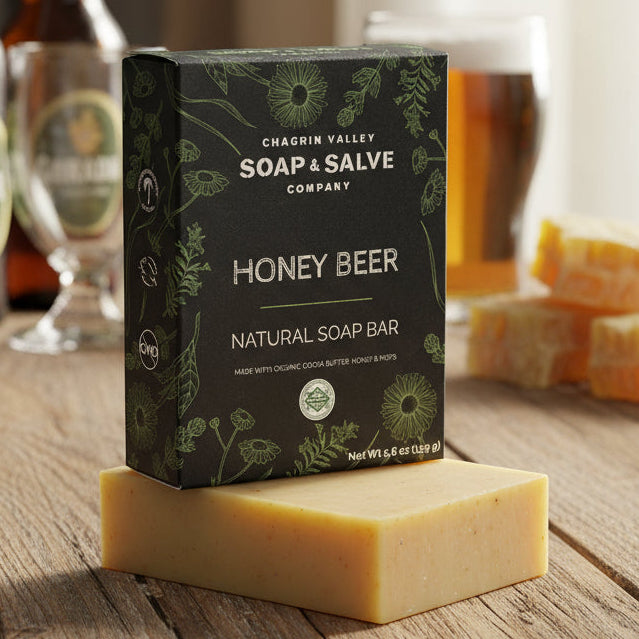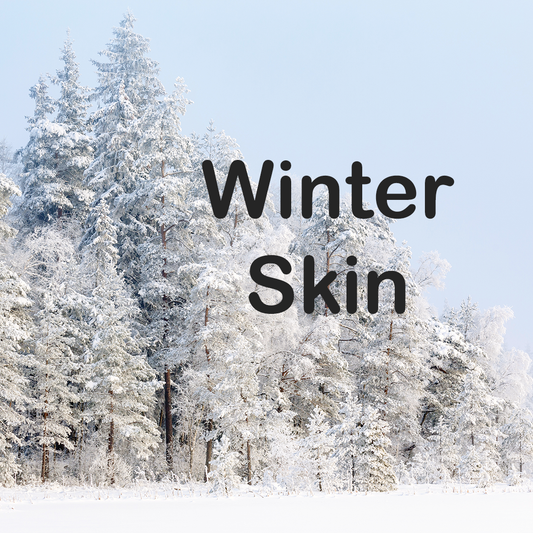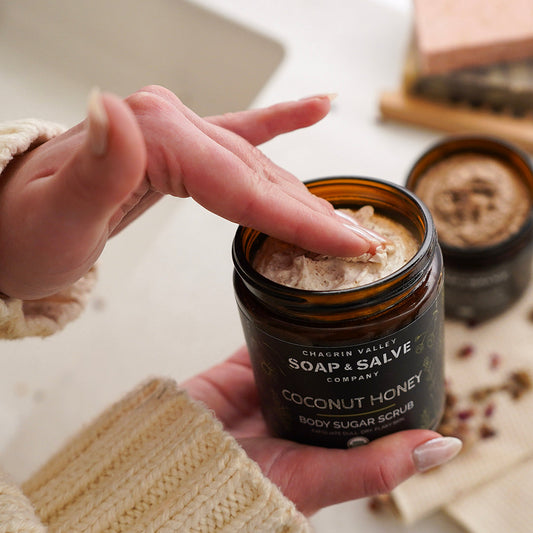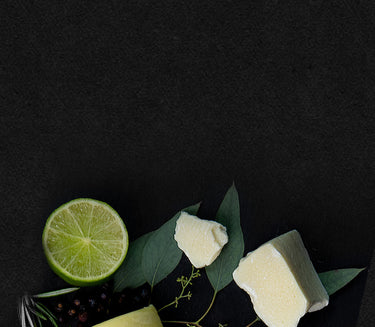
Natural Soap: Goat Milk Oatmeal
- Out Of Stock
Many people tell us they have sensitive skin — but sensitive to what?
Sensitive skin will quickly let you know if it doesn’t like something. A new ingredient in a skincare product, a certain fabric, a long hot shower, or even a sudden shift in the weather can set it off.
“Sensitive skin” isn’t a medical diagnosis; it’s a way people describe skin that reacts more quickly or more intensely than they expect.
For some, this sensitivity is simply part of their natural skin type, and research suggests it can even be genetic.

For others, sensitivity develops over time and is often linked to skincare habits or environmental triggers.
If your skin becomes red, itchy, tight, burning, or stinging after using certain products, it may be reacting to something in the ingredients list.
Synthetic ingredients like fragrances, dyes, preservatives, detergents, and surfactants, as well as alcohol‑based products, are common culprits.
Some people truly have thin, fine‑textured skin that reacts quickly to heat, cold, wind, or sun. This type of skin often feels dry or delicate and may flush or burn easily. Others have skin that becomes reactive only under certain conditions — seasonal weather changes, very hot showers, detergent soaps, artificial additives, or even low humidity can all lead to irritation.
It’s also common for people to confuse sensitive skin with other concerns. Rosacea, eczema, and allergic contact dermatitis can look or feel similar, which is why understanding your triggers is so important.
Facial skin behaves differently from the skin on the body. It’s thinner, contains more hair follicles, and produces more oil — yet it’s also constantly exposed to harsh weather, pollution, and over‑washing.
Because of this, facial skin can feel sensitive or dry even when the rest of the body does not. This page focuses on sensitive body skin.
🌿 For guidance specific to sensitive facial skin, explore our Help Me Choose Natural Facial Skin Care guide.








Sensitive skin can show up in several ways, often depending on triggers and environment.
Dry, Itchy, Tight, Flaking or Peeling Skin: Often linked to dryness, harsh skin care products, hot water, or cold, windy weather.
Redness: May appear as blotchiness, flushing, small red bumps, or a general “warm” look to the skin.
Stinging & Burning: Common when using detergent‑based soaps, products with alcohol or synthetic fragrance, or strong acne or anti‑aging formulas.
The good news is that sensitive skin often feels much better once you simplify your routine and choose gentle, thoughtfully formulated products that support your skin instead of irritating it.
Skin concerns like sensitivity, eczema-prone skin, rosacea-prone skin, and allergic contact dermatitis are often triggered by what’s inside skincare products.
Ingredients such as synthetic fragrances, preservatives, dyes, detergents, surfactants, and strong “active” ingredients like retinols or AHAs are common culprits.

Skin that is easily irritated thrives on simplicity.
When skincare is made with a small number of thoughtfully chosen ingredients, there are fewer opportunities for irritation, fewer hidden triggers, and a gentler experience overall.
Simply put, the less your skin has to cope with, the calmer and more comfortable it can remain.
At the same time, when skin is easily reactive, almost anything can become a trigger. So while simpler natural products are often gentler, ingredients such as botanicals and essential oils can still cause irritation for some.
Understanding your personal sensitivities is key. If a product irritates your skin, reviewing the ingredient list can help you recognize patterns and avoid future flare-ups.
And whenever you try something new, a quick patch test is a smart way to check compatibility before applying it more broadly.
Sensitive skin may look red or blotchy, or feel dry, itchy, or easily irritated — sometimes for reasons that are hard to pinpoint.
People with sensitive skin often discover that simpler is better.

They tend to prefer natural soaps made without detergents, synthetic fragrances, dyes, preservatives, or unnecessary additives, all of which can leave the skin feeling uncomfortable.
Gentle, straightforward formulas with nourishing oils, butters, and soothing botanicals usually offer the most predictable, comfortable experience.
Our sensitive skin customers often prefer:
Try a few travel-size bars — because your skin will always tell you more than any chart or category can.
🌿 Explore: Help Me Choose Natural Soap for My Skin









One of the biggest triggers for sensitive skin is a weakened skin barrier caused by moisture loss.

Sensitive skin is reactive skin — easily irritated and protected by a delicate moisture barrier. When that barrier isn’t doing its job, irritants enter more easily, and water escapes more quickly, leaving skin dry, tight, and more prone to stinging or redness.
Rich, natural oil-based creams and plant oils are often the most effective choice for sensitive skin. Unlike water-based lotions, which evaporate quickly, these nourishing formulas stay on the skin longer to help slow moisture loss.
They soften the surface, smooth rough patches, and help prevent the cycle of dryness → irritation → more sensitivity.
Remember, sensitive skin thrives on simplicity. Fewer ingredients mean fewer hidden triggers.
Moisture‑sealing natural oil-based creams help in a few important ways:
The best time to moisturize is immediately after bathing or showering, while your skin is still warm and slightly damp. At that moment, your skin holds the most water, and applying a cream or oil helps seal it in before it can evaporate. Warm water softens the outer layer of skin, and cleansing removes surface debris — creating the ideal moment for moisturizers to spread easily and absorb more effectively.
Because moisturizers play such a central role in supporting skin, we’ve created a separate guide that walks you through our different moisturizers and how to choose the best one for your needs.
🌿 Explore: Help Me Choose Natural Body Moisturizers
Exfoliation isn’t always necessary, and for sensitive skin, it should always be approached gently. Harsh exfoliants can easily damage delicate skin, leaving it irritated, inflamed, or feeling raw.
 Many commercial scrubs rely on strong acids, salts, or large, rough particles that can create tiny tears in already sensitive skin. Instead, choose exfoliators made with fine, gentle particles that polish away dead skin cells without scratching or overstimulating the skin.
Many commercial scrubs rely on strong acids, salts, or large, rough particles that can create tiny tears in already sensitive skin. Instead, choose exfoliators made with fine, gentle particles that polish away dead skin cells without scratching or overstimulating the skin.
Products with simple, natural ingredients are always a better choice for sensitive skin, since fewer ingredients mean fewer opportunities for irritation.
Options like Facial Sugar Scrubs or gentle exfoliators such as Adzuki Micrograin Scrub help remove dull surface cells while keeping skin calm and comfortable. Because facial scrubs are formulated to be gentler, they are often an excellent choice for exfoliating sensitive skin on the body as well.
It’s also worth remembering that mild exfoliation happens naturally every time you wash your face. The gentle friction from your hands, a soft washcloth, or a facial pad often provides all the exfoliation sensitive skin needs.
👉 Learn More: The Nitty Gritty of Exfoliation
Old‑fashioned herbal salves are helpful for spot‑treating areas of sensitive or irritated skin.
 Traditionally used to soothe and protect dry, rough, or easily irritated skin, herbal salves are concentrated blends of nourishing oils infused with beneficial herbs.
Traditionally used to soothe and protect dry, rough, or easily irritated skin, herbal salves are concentrated blends of nourishing oils infused with beneficial herbs.
They form a protective layer on the skin’s surface that helps shield delicate areas from further irritation while supporting the skin’s natural recovery process.
Because they rely on just a few organic ingredients, herbal salves are often easier for sensitive skin to tolerate — offering comfort without the irritation that can come from more complex products.
Since herbal salves contain no added water, they remain on the skin longer than many water-based lotions, making them particularly useful for very dry patches or areas exposed to frequent washing or harsh weather.
They offer a convenient way to deliver the soothing properties of herbs directly to the skin, helping calm and comfort stressed areas while maintaining moisture where it is needed most.
🌿 For a comparison of all of our salves, explore our Help Me Choose a Salve Guide
Bathing can be wonderfully soothing for sensitive skin — as long as the products in the water are gentle, simple, and free from harsh additives.
Sensitive skin is easily disrupted by brightly colored, fragrant bubble baths, bath balms, and bath salts, which often contain detergents, artificial fragrances, and dyes that can leave sensitive skin feeling dry, itchy, or irritated.
 Sensitive skin does best with uncomplicated ingredients.
Sensitive skin does best with uncomplicated ingredients.
Our Herbal Bath Teas offer a gentler alternative. Instead of dissolving powders or foaming agents into the water, bath teas steep whole herbs and botanicals, allowing their soothing properties to infuse the bath while keeping plant material contained.
Ingredients like oats, chamomile, calendula, and other calming herbs have long been used to comfort dry, delicate, or easily irritated skin.
A warm bath infused with these botanicals can help soften skin, ease dryness, and leave sensitive skin feeling calm and refreshed.
For best results, keep bath water warm rather than hot, and follow with a gentle moisturizer while skin is still slightly damp to help lock in moisture.
A bath should never leave sensitive skin feeling stripped or reactive. A simple, natural bath tea helps turn bathing into a gentle ritual that softens, soothes, and supports the skin’s natural balance.
👉 Learn More: Bath Tub Tea Recipes & Simple Additions
Hot Baths or Showers
Hot water can dry and irritate sensitive skin. Choose shorter showers or baths in warm — not hot — water, and use mild, fragrance-free soaps. Be especially gentle with areas that are already irritated, cracked, or inflamed.
Synthetic Fragrances
Synthetic fragrance, often listed as fragrance or parfum, is one of the most common triggers for sensitive skin reactions. Many people notice improvement simply by switching to fragrance-free products. Be cautious with products labeled “unscented,” as they may still contain fragrances used to mask odors. Always check ingredient lists carefully.
Preservatives and Harsh Additives
Products containing water require preservatives to prevent bacteria and mold growth, but some preservatives and additives can irritate sensitive skin. Alcohol, harsh exfoliants, detergent cleansers, artificial dyes, and strong treatment ingredients like retinol or glycolic acid may also cause irritation for sensitive skin types.
Heavy Makeup
Heavy foundation can sometimes trap oil, sweat, and dead skin cells, leading to clogged pores and irritation. When possible, use lighter coverage or a tinted moisturizer instead.
*If irritation or sensitivity continues or worsens despite gentle care, always consult a healthcare professional to rule out allergies or underlying conditions.
Sensitive skin isn’t a flaw — it’s simply skin that needs a milder, simpler approach.
Sensitive skin asks us to slow down and treat it gently. With simple, nourishing products and a thoughtful routine, skin can feel calmer, more comfortable, and better able to face the day without irritation.
When you avoid too many ingredients, choose fragrance‑free products, and support the skin’s natural moisture barrier, sensitivity becomes much easier to manage.
A routine built around mild cleansers, rich natural moisturizers, and uncomplicated formulas can help calm irritation and keep the skin feeling soft, balanced, and comfortable.
With a little extra care and attention to ingredients, sensitive skin can thrive.









There are many wonderful things about winter, but the cold dry, windy air outside combined with the dry heated air inside and lower humidity drain moisture causing dry, flaky, irritated, red, or itchy skin. With a little extra TLC you can have soft smooth radiant skin all winter long.
Read Post
From the day we are born, our skin is our first line of defense against germs, water loss, outside heat and cold, and it helps regulate our body temperature. Your skin deserves organic skin care!
Read Post
Get informed about exfoliation! Explore the basics, benefits, and best practices for exfoliating your skin so you can make informed decisions about your skincare. Exfoliation can help encourage cell turnover, unclog pores, allow moisturizers to penetrate more effectively, and refresh the skin.
Read Post

People with severe allergies—please note: If you have severe anaphylactic-type reactions to ANY of the ingredients in ANY of our products, please do not buy our products. We have dedicated soap rooms and product rooms that are kept meticulously clean, but we cannot guarantee against possible cross-contamination of individual ingredients.
Chagrin Valley Soap & Craft is not responsible for any individual reaction to any particular ingredient. Each product description on our website includes a complete list of ingredients. People with sensitivities to any listed ingredient should not use the product. In case you are in doubt always try an allergy patch test and if at any time irritation occurs, discontinue use of the product.
The content and information on this website, provided by The Chagrin Valley Soap & Salve Company, is for educational purposes only and is in no way intended and should not be construed as medical advice to diagnose, treat, cure, or prevent any disease or health condition. The information regarding folklore or health-related benefits of certain ingredients is for educational purposes only. The information provided is not intended to prescribe or be taken as medical advice.
The information provided is not meant to substitute the advice provided by your personal physician or other medical professionals. Do not use the information found on this website to self-diagnose any medical conditions or treat any health problems or diseases. If you have medical concerns regarding yourself or your family you should seek the advice of qualified, licensed health professionals. Never disregard professional medical advice or delay in seeking it because of something you have read on this website.
This information has not been evaluated by the Food and Drug Administration. This notice is required by the Federal Food, Drug and Cosmetic Act.
Read our Full Medical Disclaimer.